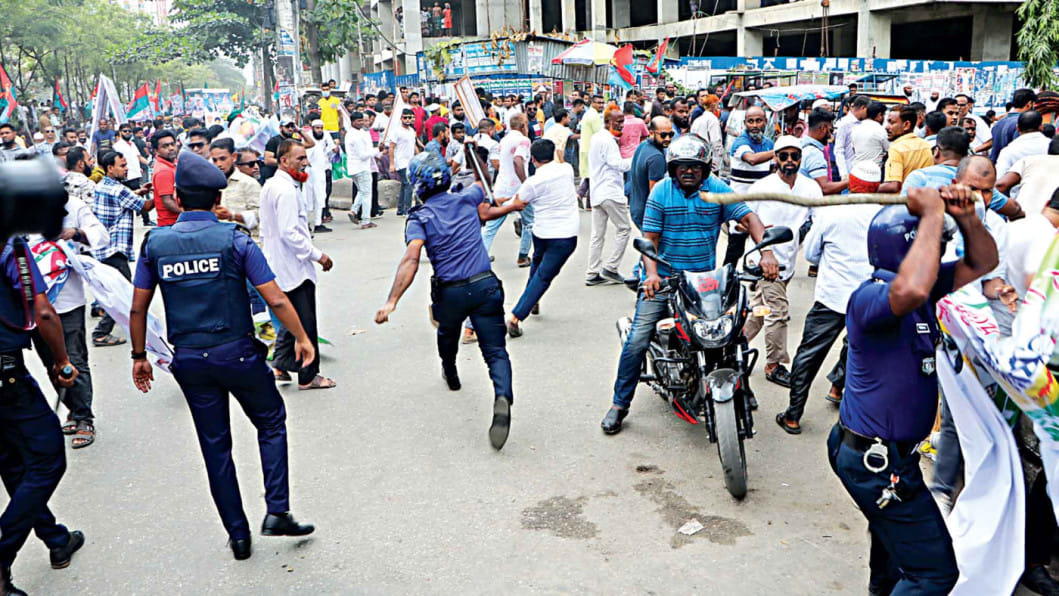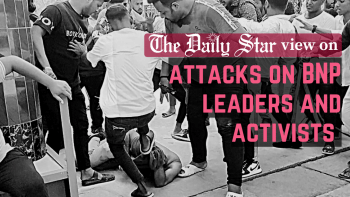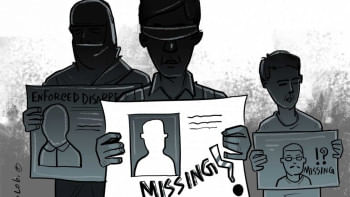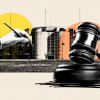Citizens’ fundamental rights are not the executive’s choice

Can the implementation of fundamental rights enshrined in the constitution be a matter of a choice for the executive? Can citizens be told that their rights, such as the rights to assembly, speak and conscience, are now available because the executive branch of the state is offering them as a gift? Answers to these questions essentially reveal whether a country is democratic or not. Answers to these – not only on paper or as rhetorical, but as a practice – are important in understanding the state of governance. Understandably, when the ruling party claims the system as democratic, both the answers are bound to be negative. This discussion has become more pertinent in the context of the events in Bangladesh in the last few weeks as the country is witnessing wanton attacks by the police and activists of the Awami League on the demonstrations and assemblies of the political opposition, Bangladesh Nationalist Party (BNP).
Interestingly, these attacks came after Prime Minister Sheikh Hasina's assurance that the opposition will be allowed to hold demonstrations and assemble. Sheikh Hasina, during a meeting with her party's organising secretaries recently, said she had instructed that opposition parties not be "disturbed" if they hold demonstrations and rallies. "Our opposition party has an opportunity; they will agitate, let them do it. Even today, I have instructed that none of those who are agitating should be arrested or disturbed," she said (Prothom Alo, August 14, 2022). Although it was not clear whom she instructed, presumably the order was meant for the police and civil administration. Why this particular order was mentioned in the party meeting held at Ganabhaban remains a question. It is also imperative that we ask why the head of the executive branch had to specifically "instruct" that the opposition be allowed to demonstrate. Isn't it a right already enshrined in the constitution?
The Bangladesh Constitution has guaranteed the right to assembly of the citizens as a fundamental right. But those who followed Bangladeshi politics over the years, especially since 2014, know how the right has been curtailed and how the combination of law enforcement agencies and the ruling party activists have foiled various demonstrations. In many instances, opposition activists were violently attacked. But what the prime minister's "instruction" revealed is that the individual's power has transcended the constitution – a classic example of executive aggrandisement, personalisation of power, and a hallmark of authoritarianism. This is not an aberration, but a pattern of governance of the past years. Although the prime minister has "assured" the opposition, her party leaders have consistently spoken against letting the BNP take to the streets. It seems the "instruction" was rhetoric and the party leaders read between the lines.

The prime minister's speech came in the wake of protests on load-shedding, price hikes and incredible suffering befallen on the citizens lately. The rising cost of essentials have badly hit the poor, lower-middle class, and middle class while the ruling party leaders and its supporters are enjoying the fruits of corruption and rent-seeking. Capital flight has reached an unprecedented level, and a small group of businessmen, apparently close to the ruling party, are benefiting from the misery of the people.
In July, simmering anger started to be expressed. On July 31, one BNP activist was shot dead during a procession in Bhola; three days later, another succumbed to his injuries. There were protests elsewhere as well. Instead of trying to address the concerns of the citizens, the government increased the price of fuel on August 5, which added insult to injury. Consequently, the price of essentials faced another round of hikes, and opposition parties tried to take to the streets. As police and ruling party activists were attacking the demonstrators, the prime minister said her government would not "disturb" the opposition.

But what has been happening across the country is on the contrary and deeply disturbing. Not only were BNP's rallies or processions attacked, but the houses of the leaders and their business establishments were ransacked too. Unknown numbers of people have been arrested, and cases have been filed against thousands of BNP activists around the country. As before, the attacks were orchestrated by the police and the ruling party workers together. Would it be wrong to assume that the police and the civil administration have received a different message than what we heard? Was there a coded message? There is no other way but to ask these questions.
According to newspaper estimates, at least 25 BNP rallies were attacked across the country between August 22 and September 1. The houses of BNP leaders were ransacked in at least eight places. At least in six places, the police did not allow the BNP to hold rallies. These are what were reported in the media. In the wake of these troubling events, a young man named Shaon was shot dead and over 200 injured on Thursday (September 1) in Narayanganj during a BNP rally. It is reported in the media that Shaon was killed in police firing, and that firing was targeted at the demonstrators.
It is not only the BNP rallies that are being attacked; other opposition parties have also been prevented from gatherings too. Over the past years, the rights stipulated in the constitution seem to have become something only on paper. The head of the executive branch determines the rights the citizens enjoy and when they can enjoy them.

The government, in recent months, has been under pressure, including from the international community, for its abysmal human rights record. The sanctions imposed on the Rapid Action Battalion (Rab) and its officers have been followed by harsh criticism. Michele Bachelet, the UN high commissioner for human rights, during her visit to Bangladesh last month, criticised the government for the human rights situation. In the wake of the condemnations, the government wants to show that the situation is not as bad as the human rights activists are claiming. That seems to have prompted the prime minister's assurance and some space for the opposition parties. Presumably, the ruling party also wants to show that the situation is good enough for a participatory election scheduled for the coming year.
But given the troubling development of the last few weeks, and the attacks on the opposition rallies, nothing has changed. It also demonstrates how the rights of the citizens are being trampled by force. Those who think that they should remain silent because they do not subscribe to the politics of BNP, and that these attacks are being carried out against the BNP, should think twice. It is a continuation of the assaults on the fundamental rights of the citizens. Citizens' fundamental rights are not something the executive can give or take away at will.
Indeed, the use of force to suppress the opposition and undermine the rights of the citizens did not start in the past weeks; over the past decade, we have witnessed erosion of democracy in a spectacular manner. Dissent has been criminalised; lawful political activities have been described as "conspiracy" – not only against the government, but also against the state. In such a context, these relentless attacks are not only a message to the BNP, but also to all political parties that they, too, will be dealt with in a similar manner if they take to the streets. Imparting fear in society, engaging in intimidation of the dissenting voices and outright assaulting those who dare to speak are hallmarks of autocracy. Hopefully, the opposition politicians understand the message, and decide what role they need to play.
Ali Riaz is a distinguished professor of political science at Illinois State University in the US, and a non-resident senior fellow of the Atlantic Council.


 For all latest news, follow The Daily Star's Google News channel.
For all latest news, follow The Daily Star's Google News channel. 











Comments